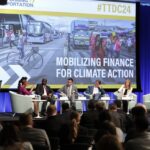Posts tagged with 'decarbonize'
The adoption of any new technology involves some degree of adaptation, and battery electric buses (e-buses) are no exception. After decades of experience with diesel vehicles, cities and operators need to understand the technical and operational specifications of e-buses to ...

If a picture can tell a whole story, then the image below of an intersection in Dar es Salaam, Tanzania, shows the past, present and future of global transformation in the transport sector. During Transforming Transportation 2024, which focused on ...

India aims to reduce the emissions intensity of its economy by 45% by 2030, compared to 2005 levels, and to achieve net-zero emissions by 2070. The country can’t achieve either goal without a radical transformation in its buildings and construction sector, which was responsible for around 17% of the nation’s ...

In Asia, 14 countries — accounting for 26% of global transport emissions in 2019 — have made economy-wide net zero commitments. Momentum towards zero-emission transport is growing with countries enhancing ambition and including transport-related targets in their nationally determined contributions (NDCs). However, ...

Electric vehicle sales have been growing exponentially due to falling costs, improving technology and government support. Globally, 10% of passenger vehicles sold in 2022 were all-electric, according to analysis of data from the International Energy Agency. That’s 10 times more than ...

Transportation connects us to one another. It’s how we get to school and work, how we visit our families, and how we access our food and health care. It’s also how we ship goods and deliver services. As economies and ...

This is the third installment in a series of articles documenting lessons learned across NDC-TIA country activities, to be published throughout 2022. In Vietnam, a country home to 97 million inhabitants, there are 65 million registered motorcycles and mopeds,1.5 million ...

Urban freight and delivery services boomed during the COVID-19 pandemic as consumers switched to online shopping when businesses were forced to close. The surge in online market activity that began in 2020 builds on a decade of steady growth related to the ...

Editor’s Note: This article was updated in September 2022 to present new findings from WRI’s dataset tracking electric school bus adoption in the United States, covering April to June 2022. To the best of our knowledge, these statistics are up to date as ...

The world’s ability to overcome the climate change challenge hinges, in part, on what happens on China’s roads. China’s cars, buses, trucks, shipping and other transport generated 828 million tonnes of greenhouse gases in 2014. That’s almost the equivalent of the EU ...

Many governments and authorities started to build cycling infrastructure during the COVID-19 lockdowns. But were these developments temporary or the foundation of a permanent shift towards truly cyclable cities? In this episode of WRI’s “Big Ideas Into Action” podcast, we ...

The latest findings from the IPCC paint a grim picture: Despite some signs of progress, the world’s chance of holding global warming to 1.5 degrees C (2.7 degrees F) is shrinking — and with it, our ability to prevent the most dangerous ...

U.S. President Biden has touted the potential climate benefits of the Bipartisan Infrastructure Law, which makes historic investments in transportation, the country’s largest and fastest-growing source of greenhouse gas emissions. But while the bill’s investments could significantly lower transportation emissions, those reductions are not ...

While building construction and operations are among the largest contributors to climate change, accounting for nearly 40% of energy-related CO2 emissions globally, they also remain the most cost-effective climate mitigation solution available. Every $1 invested in efficiency saves $2 in ...

With every fraction of a degree of global warming, climate change impacts will intensify. In the latest installment of the Intergovernmental Panel on Climate Change’s (IPCC) Sixth Assessment Report, 278 scientists from 65 countries find that the world should peak GHG ...
























![Why Cycling Is Critical for Resilient Cities [PODCAST]](https://thecityfix.com/wp-content/uploads/2022/06/14395435439_2b18f2bcb4_c-690-150x150.jpg)





